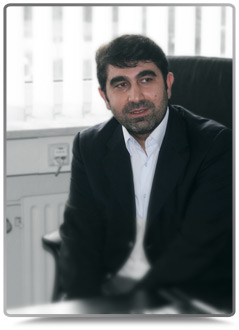Uniday in Bielefeld, 22nd October 2011
The fourth annual Uniday will be held in Bielefeld on 22nd October 2011. We have asked Celal Tüter, the Head of University Students, Youth Organisation, IGMG, questions on Uniday 2011.
Perspektif: Mr Celal, it is seen that you embarked on a long journey. You will carry out the third Uniday programme which started in 2007. You said that ‘from the tradition to the future’, ‘one who does not repeat cannot renew’, now you say that ‘your dreams rely on the past’.
Celal Tüter: The youth are said to establish their future. However, we argue that the future cannot be established unless the tradition is established or is sought to be established. We argue this because our history and past argue the same. We cannot bear fruit toward the future, if we are not rooted in in our historical values. Hence, we preferred a title which represents the same assertion.
Perspektif: What does ‘dreaming the past programme’ mean to a university students in Europe who are invited?
Celal Tüter: A person is like an establishment. Every establishment which continued its existence in the history has had a thought system. Like these establishments, there are certain values which a person as a character represents. As the head of university students, we want to make reference to those values that build the character of youth who find an opportunity to study university in Europe. Moreover, with this dream, it is highlighted that we can build a better future by transmitting the accumulation of the past to the present day.
Perspektif: When Uniday and the works of IGMG university students are evaluated together, what picture emerges?
Celal Tüter: As the head of university students, IGMG, our first aim is the success of our youth in universities. This is our first target. Another target is our thought and spiritual horizons which are our roots. With these two purposes, we can advance to the future. In this direction, seminars, symposiums, scientific works, and more programmes have been organised by our department. Uniday gives us the opportunity to announce these programmes under one roof.
Perspektif: When we come to the content of the programme, Prof. Mahmut Erol Kılıç and Prof. Dr Salim Al Hassan were invited as speakers.
Celal Tüter: Mr. Mahmut Erol Kılıc is an important researcher in the field of Sufism in Turkey. He has put intensive efforts in recent years under the Islamic Conference. So he is capable of transmitting his theoretic knowledge to practical efforts. We have introduced people who blend knowledge and experience to the European university students in the preceding Uniday programmes. We intend to do the same this year by giving leading figures place in our programmes. Prof. Dr. Salim Al Hassan has made great efforts at reinventing scientific tradition in Islamic history. We need to know Islamic thinkers and scientists who feed today's technology and culture. Therefore the works of Prof. Dr. Salim Al Hassan are very important for us.
Perspektif: You give place for music in Uniday programmes. What are we going to listen to in this programme?
Celal Tüter: Uniday is a new model. It is an effort to disseminate knowledge and art to a larger community. If we argue that from the tradition to the future, that one who does not repeat cannot renew and finally that our dreams are based on the past, we should disseminate idea and art together. We are a society that believes that in order to understand Süleymaniye mosque, Itri should be listened to. We should give place to music. In this programme, we will host Göksal Baktagir, one of the masters of our music with his new project, ‘east wind’.
Perspektif: There is also an exhibition entitled ‘hilye-i Şerif,’ can you talk to us a bit about this?
Celal Tüter: When we visit our elders in Turkey, we all come across these calligraphers. At our homes, there are ‘hilyes’ which mention the appearance of Prophet Muhammad (pbuh). These are ‘Hilye-i Şerif’ which are the precious examples of our fine calligraphies which are one of the important parts of our rich cultural heritage. Hilye means beauty and ornament. Hilyes are made with the elegance of the fine art of calligraphy. These are texts, poetic or prose which mention the appearance, the noble qualifications, character, humanistic and moral qualities of the prophet Muhammad (pbuh). This is one of the beautiful examples of the remembrance of our Lord. We’ve included Hilyes in the programme in order to revive this tradition and demonstrate these beautiful examples of calligraphy.
Perspektif: We are eagerly awaiting the fourth annual Uniday and wish you great success in your future projects.
Celal Tüter: We are looking forward to seeing all of our youth and hope to see you on 22nd October 2011.
